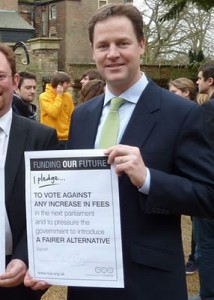 The student protests on the 10th November and the forthcoming demonstrations around the parliamentary vote on 9 December, have brought the opposition to the government’s proposed changes to university funding to the forefront of national debate. The UK’s National Union of Students’ President Aaron Porter argues that now is the time to engage in longer-term campaigning and lobbying to get student voices’ heard, through an innovative ‘Right to Recall’ campaign that would sack parliamentarians who broke campaign promises on tuition fees.
The student protests on the 10th November and the forthcoming demonstrations around the parliamentary vote on 9 December, have brought the opposition to the government’s proposed changes to university funding to the forefront of national debate. The UK’s National Union of Students’ President Aaron Porter argues that now is the time to engage in longer-term campaigning and lobbying to get student voices’ heard, through an innovative ‘Right to Recall’ campaign that would sack parliamentarians who broke campaign promises on tuition fees.
The national demonstration of students on 10 November against the proposed hike in fees and education funding cuts was a tremendous success in reaffirming the widespread opposition there is to these policies. Of course, the event will always to some extent be overshadowed by the violent actions of a few hundred at Millbank Tower. Certainly, this is where the media interest has been focused. But when I look back on that Wednesday I will think of the 50,000 students, lecturers and members of the general public who marched peacefully and proudly through central London, leading Prime Ministers’ Questions to focus on the issues of tuition fees and the Education Maintenance Allowance (EMA).
But the National Union of Students (NUS) believes campaigning must involve a mixture of protests and engagement in the policy debate and political lobbying. It is in this vein that the NUS recently launched the ‘Right to Recall’ campaign. This campaign is the follow up to ‘Vote for Students’ campaign organized during the run-up to the general election in order to encourage parliamentary candidates to clarify where they stood on tuition fees. The Conservative Party and Labour Party were being particularly elusive as to whether they would support a rise in fees (whilst the Lib Dem manifesto proposed that they would abolish fees entirely over 6 years). We therefore developed the NUS pledge which we asked all candidates to sign, promising that they would vote against any rise in tuition fees if they were to be elected into parliament. When it came to mobilising the student vote, we were therefore able to state whether a candidate had signed the pledge or not.

Through the ‘Right to Recall’ campaign we aim to keep politicians accountable to the promises they have made – borrowing from proposals that all parties have referred to over the last few months in which by-elections can be triggered if 10 per cent of people in a given constituency sign a petition declaring their Member of Parliament guilty of “serious wrongdoing”. We will be encouraging students, lecturers and the general public to register on the ‘Right to Recall’ website, stating: “If my MP votes for higher university tuition fees, I want them recalled, and I pledge not to vote for them or their party at the next General Election.”
There is a genuine debate to be had as to whether breaking a personal pledge made during the election campaign constitutes “serious wrongdoing” – but whatever the outcome of this debate, we believe that the campaign should serve to reiterate the strength of feeling amongst students, lecturers and the wider public on the issue of tuition fees and university funding.
The campaign will also be looking at the proposed abolition of the Education Maintenance Allowance – the means-tested allowance paid to students aged 16-19 who remain in education. Both Labour and the Conservatives said during the election campaign that this would be retained, whilst the Liberal Democrats suggested cutting the bonus element of the allowance whilst retaining the core payments. The Government’s proposals to scrap EMA represent yet another broken promise to the electorate.
In addition to ‘Right to Recall’, we have been supporting students’ unions in undertaking letter-writing campaigns to their local MPs, through the ‘Education Write-Off’ campaign. Politicians regularly refer to the size of the mailbags they receive as an indication of the mood of their constituents on a particular issue – and so what is a seemingly simple act can have very a powerful effect, particularly in the weeks coming up to the vote on the fees rise. And, given that opposition to the rise in fees enjoys such wide public support, we are also developing ways of highlighting and entrenching this – such as through the upcoming ‘Families Against Fees’ drive.
It is often said that students and young people do not engage sufficiently in politics, but students did engage in the 2010 general election in record numbers, and are engaged now. Let us hope that through our collective actions, we can defend our further and higher education systems for ourselves and for future generations of students to come.
Aaron Porter is the President of the National Union of Students (NUS) having previously served as their Vice-President (Higher Education) for two terms. Aaron is responsible for leading representation and campaigns for students in UK higher education.
The parliamentary vote on tuition fees will take place on 9 December. Both the University and College Union, and the National Union of Students have planned days of lobbying around 8/9 December, including a candlelit vigil on the evening of the vote on 9 December, followed by a rally in Westminster.
Click here to respond to this post
Please read our comments policy before posting





2 Comments